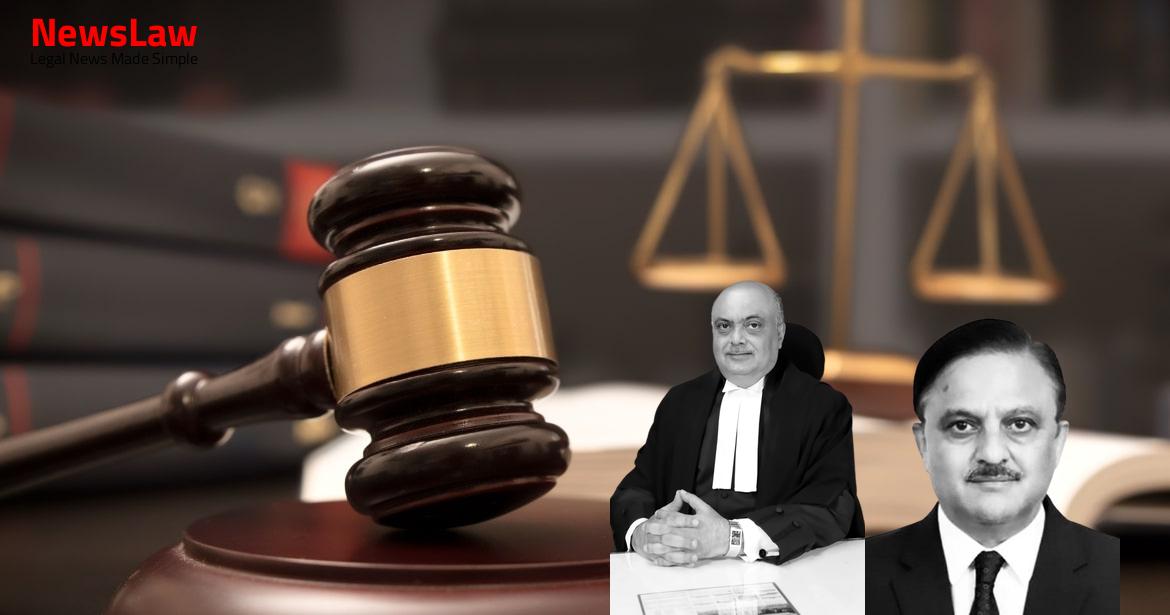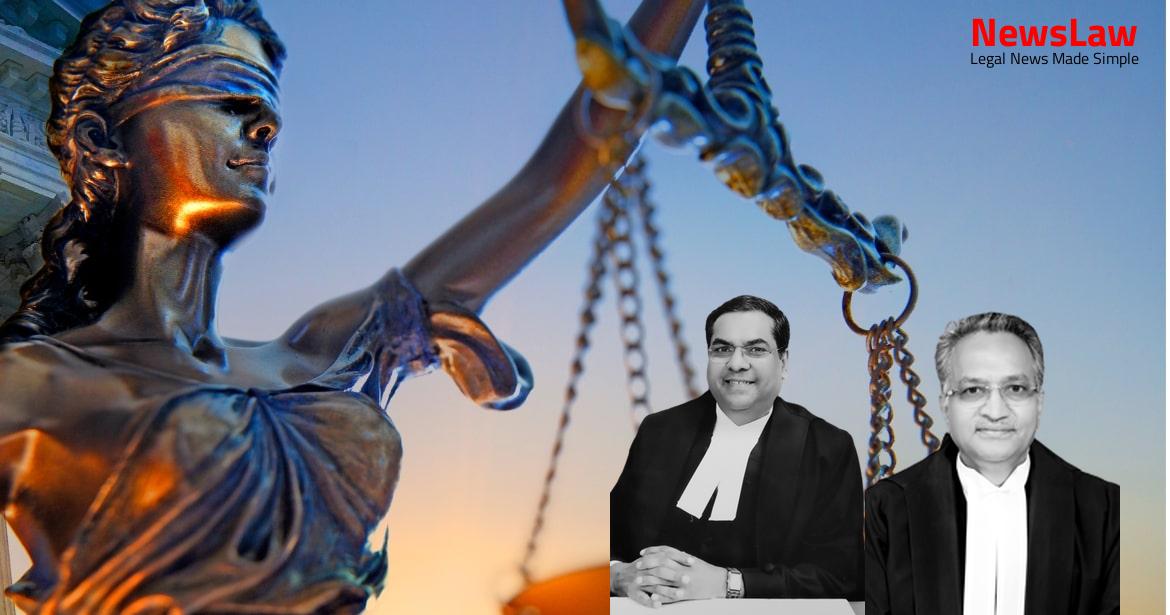Delve into the intricate analysis and interpretation of tax legislation in the recent Supreme Court judgment on Section 17(5)(d) of the CGST Act. Explore the implications of the ruling for businesses and the application of legislative provisions in economic contexts. A significant step towards clarity and consistency in tax laws.
Facts
- Appellants were respondents in a writ petition concerning clauses (c) and (d) of sub-section (5) of Section 17 of the CGST Act.
- A consequential prayer for a writ of mandamus was made to grant the benefit of ITC to the original parties.
- The core issue revolved around the interpretation and application of specific clauses of the CGST Act.
- The appellants were requested to enforce the provisions of the Act in favor of the concerned parties.
- The High Court held that if the assessee is required to pay GST on the rental income from the mall, it is entitled to ITC on the GST paid on the construction of the mall.
- The narrow interpretation of Section 17(5)(d) by the Department would frustrate the purpose of the Act.
- The decision in the case of Eicher Motors Limited & Anr. v. Union of India & Ors. supported reading down Section 17(5)(d) to benefit the assessee.
- Writ petitioners argued that Section 17(5)(c) and Section 17(5)(d) restrictions prevent them from availing GST credit on construction expenses against rental income.
Also Read: Decision on Revised Income Tax Return Time Limit: Wipro Finance Ltd. v. Commissioner of Income Tax
Issue
- The main questions for consideration are whether the definition of ‘plant and machinery’ in the explanation appended to Section 17 of the CGST Act applies to the expression ‘plant or machinery’ used in clause (d) of sub-section (5) of Section 17.
- Clarification is needed on the application and interpretation of ‘plant or machinery’ within the context of the relevant sections of the CGST Act.
- Further analysis is required to determine the scope and implication of the definitions provided in the legislation.
Also Read: Legal Battle: State of Uttaranchal vs. Plaintiffs
Arguments
- The argument submitted by the Petitioner is founded on a three-pronged basis.
- The expression ‘plant or machinery’ is contested to be read as ‘plant and machinery’ for alignment with legislative intent.
- Reading ‘or’ as ‘and’ or vice versa is considered common practice.
- The distinction between ‘plant and machinery’ in Section 17(5)(c) and ‘plant or machinery’ in Section 17(5)(d) is highlighted without clarification from the Government.
- Denial of ITC on rentals collected by the assessee who constructed the building is alleged to unjustly enrich the State and violate the statutory right to avail ITC.
- The importance of ITC as the bedrock of the GST framework is emphasized.
- The argument asserts that ‘on its own account’ should be interpreted in the context of construction for personal use rather than for business purposes.
- The impact of tax-on-tax scenario due to denial of ITC is pointed out.
- The argument contests the intelligence of the differentia of immovable property creation in taxation statutes.
- The submission delves into the historical evolution of ITC and its importance.
- The contention questions the denial of ITC solely based on the creation of immovable properties.
- The argument highlights a hypothetical scenario where denial of ITC could lead to cascading tax burden.
- The statutory right to ITC is emphasized as a crucial aspect.
- The challenge to the constitutional validity of the denial of ITC is summarized.
- The classification of assessees based on the construction and sale of immovable properties is justified as per the Petitioner.
- Constitutional bar in Entry 49 of List II only against the levy of GST on land and buildings, not against the grant of ITC on movable goods and services.
- Legislature allows ITC on immovable property if it meets functionality or essentiality criteria of a plant.
- GST leviable on renting and selling buildings before completion certificate is granted.
- No supply of capital goods, plant, or machinery in the case at hand.
- Sections 16(3) and 17(5) should be read harmoniously.
- Intention to permit ITC on plant or machinery under Section 17(5)(d) even if immovable.
- Disallowance of ITC on goods and services used in construction logical only if buildings are intended for sale as stock.
- Promoting ITC on goods and services used for construction when buildings are used for taxable supplies is not contradictory but necessary.
- Not permitting ITC in such cases would lead to absurdness and break the ITC chain.
- Provisions should be used only in case of supply of capital goods or plant and machinery where ITC has been taken.
Also Read: Supreme Court’s Judgement on Discharge Application of Dilip Bhai
Analysis
- The analysis section delves into the interpretation and constitutionality of Section 17(5)(c) and Section 17(5)(d) of the CGST Act.
- The distinction between the expressions ‘plant and machinery’ and ‘plant or machinery’ is highlighted, emphasizing the conscious choice made by the legislature in using these terms in different contexts.
- The discussion involves the application of different conditions and exceptions specified under these sections, focusing on the commercial understanding of the term ‘plant’ in the context of taxation statutes.
- Various arguments regarding the constitutional validity of the clauses are scrutinized, including the absence of an intelligible differentia, unequal treatment of assessees, and issues of discrimination and classification.
- The judicial review principles governing tax legislation interpretation are reiterated, emphasizing strict interpretation, avoidance of equitable considerations, and adherence to literal language.
- Legal precedents and expert opinions are cited to support the conclusions drawn, underscoring the complex nature of economic issues and policy choices surrounding tax legislation.
- The section also addresses challenges related to the Legislature’s policy choices, complex balances in tax collection, and the latitude provided in matters of tax legislation design.
- The court considered whether a building used for running a hotel or cinema business could be treated as a plant.
- Various cases and legislative provisions were referenced to determine the classification of a building as a plant.
- The term ‘plant’ was analyzed in the context of hotels and cinema buildings.
- The court emphasized the functionality test to decide whether a building qualifies as a plant.
- The classification of property for taxation purposes was discussed, highlighting the wide discretion of the legislature in such matters.
- Different judicial decisions were cited to illustrate the interpretation of the term ‘plant’ in taxing statutes.
- The court examined the distinction between buildings used for specific businesses and their classification as plants.
- The judgment in Anand Theatres case was discussed in relation to the definition of a plant in tax laws.
- The relevance of economic, social, and administrative factors in taxation classification was emphasized.
- The principle of equality in taxation laws and the legislative discretion in tax classifications were explored.
- The court highlighted the importance of reasonableness and rationality in taxation classifications.
- The impact of taxation laws on businesses, trade, and industries, specifically in relation to buildings and plants, was deliberated.
- The necessity of adherence to legislative choices and policy decisions in fiscal matters was underscored.
- The application of tax laws to specific industries like hotels and cinemas was analyzed in the context of plant definition.
- The need for a clear and practical interpretation of tax statutes in line with economic conditions and fiscal objectives was discussed.
- Section 9 of the CGST Act provides for the levy and collection of central goods and services tax on intra-State supplies of goods or services.
- Clause 5(a) of Schedule II states that renting an immovable property is considered a supply of service.
- The explanation defines the meaning of the expression ‘plant and machinery.’
- The Union legislature cannot levy taxes on lands and buildings as it is exclusively a State subject.
- Section 2(102) defines service as anything other than goods, money, and securities.
- Section 7 defines the scope of supply as including all forms of supply of goods or services made for consideration in the course of business.
- Section 16 deals with input tax credit eligibility and conditions for registered persons.
- Section 17 specifies categories of input tax credit that shall not be available under certain circumstances.
- Schedule II lists activities or transactions treated as supply of services, including leasing of land and buildings.
- Schedule III specifies activities or transactions that shall not be treated as supply of goods or services.
- The decision in the case of Anand Theatres is limited to hotels or cinema theatres as per the larger Bench decision in the case of Karnataka Power Corporation.
- The applicability of the decision in Anand Theatres is restricted to specific types of establishments only.
Decision
- The functionality test must be applied in each case to determine if the construction of an immovable property qualifies as a ‘plant’ under Section 17(5)(d).
- Civil Appeal Nos. 2948 and 2949 of 2023 are remanded to the High Court of Orissa for reevaluation on whether a shopping mall can be considered a ‘plant’ under Section 17(5)(d).
- The final decision on whether the construction of immovable property amounts to a plant must be made based on the functionality test in each case.
- Any conclusive adjudication on this matter should be done in appropriate proceedings based on facts.
- The petitioners are encouraged to pursue appropriate legal avenues to address this issue.
- The writ petitions are rejected based on the interpretation provided by the court regarding clause (d) of sub-section (5) of Section 17 of the CGST Act.
Case Title: CHIEF COMMISSIONER OF CENTRAL GOODS AND SERVICE TAX Vs. M/S SAFARI RETREATS PRIVATE LIMITED (2024 INSC 756)
Case Number: C.A. No.-002948-002948 – 2023



